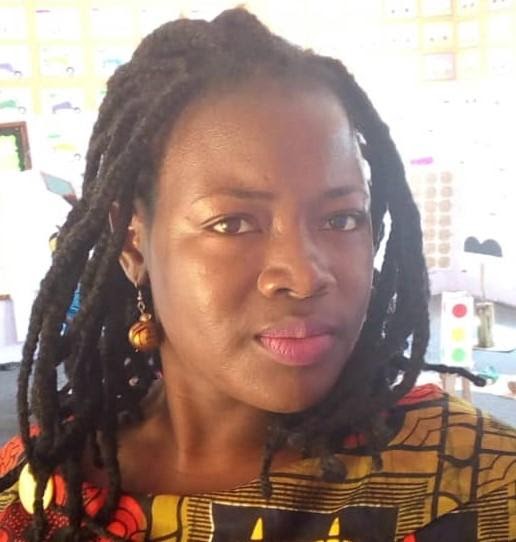
10 Nov Exodus 19:4-6 – Priests
Meet the Author of this Study Guide
Samalie Nabwami Byabajungu is a Ugandan and a Muganda by tribe. She has been married to Henry Byabajungu for 8 years. They have two sons. She is a social worker by profession and runs a private events management business. She is Assistant Manager at Amazing Grace Hope Living Church in Nalyamagonja-Gayaza, Uganda, as well as serving part time as an Administrator at East African Gospel Academy, a local music academy. She attended Makerere University in Kampala and graduated with a first class in Bachelors of Adult and Community Education. She says: “I take the pleasure to write this Love Story Journal Entry, because it is equally useful to me to explore and meditate about the Bible messages and how they are applicable in my life. I take great pleasure to learn the deep insights and revelations that I am receiving, which I thought was only a privilege of experienced or ‘anointed’ Bible teachers and ministers.”


EXODUS 19:4-6
You have seen what I did to the Egyptians, and how I bore you on eagle’s wings and brought you to myself. Now therefore, if you obey my voice and keep my covenant, you shall be my treasured possession out of all the peoples. Indeed the whole Earth is mine, but you shall be for me a priestly kingdom and a holy nation. These are the words that you shall speak to the Israelites.
Scripture Taken from New International Version,
© Biblica, 2011
WHY THIS PASSAGE WAS CHOSEN
This Love Story Journal entry highlights three verses in the Book of Exodus, the second book in the Bible. In the Genesis journal entry, we saw God promise Abram that He would bless a group of people.
This passage (Exodus 19:4-6) reveals that God graciously delivered the Hebrews from slavery in order to adopt them as His own people. In response, the Israelites were to obey the Lord so that they might serve in the special role that God intended.
As God’s personal treasure, Israel was to bear witness of the Lord to the world and bring God’s rule on earth. With the coming of Jesus, this mission to the nations would be inherited by the church. Thus, New Testament authors apply the terms used in this passage to the church (1 Peter 2:9; Revelation 5:10).
Exodus carries forward the story of God’s promise to bless Abraham and make him a great nation. Exodus narrates the liberation of Israel from Egyptian captivity under the leadership of Moses.
After ten devastating plagues against Egypt, Moses led God’s new nation to the wilderness of Sinai. Exodus then records the laws God gave on Mount Sinai to govern the life and worship of the nation.
Israel’s exodus from Egypt is the redemptive highlight of the Old Testament. It stands at the core of the Old Testament as the greatest demonstration of the saving acts of God before Christ.
In these Study Guides we explore how God’s promise to love us and welcome us into His family is relevant today. It is even more relevant when we see how Samalie, from a completely different culture than any other of the journal authors, has written this Epic Love Story Journal as one who has already trusted God and become part of His family, too. The Love Story continues as we experience Samalie’s lovely insights into God’s amazing delight in His people, past, present and future.
BREAKING DOWN THE TEXT
Here God reminds the Israelites how lovingly, mercifully and undeservingly He rescued them out of oppression. He did not need to repeat all the acts of kindness He performed to deliver them out of slavery; He simply heard their cry and felt compassion for them. While He could have justified the justice and punishment He placed on Adam and Eve and all people, He instead chose to demonstrate His might and faithfulness, making a way for His people to be free where they never expected a way out.
This verse also reveals how God prefers to bring people to Himself and reach out to them in love and grace instead of executing judgment. From raising up Moses to lead them out, to the opening and closing of the sea, God “brought the Israelites out of Egypt” to Himself, all of which became part of God’s Epic Love Story for His people (Exodus 12:51).
Here God gives a promise to Abraham’s descendents with the condition of obedience. They had broken their personal and covenantal relationship with God so as to say, “We don’t need nor trust God.” Neither Abraham nor the Israelites trusted God, and they ultimately disobeyed God’s command to inhabit land He provided them. So, the only path that could lead the Israelites back to a right relationship with the Lord was turning in obedience and trusting, believing that God is good and worthy and deserving of their love and worship.
Here God declares the Israelites holy by telling them they are set apart by the way they trust only in Him. This trust would bring them into a loving and resting relationship- a shalom- with God and show His love for all people of all nations. God delights in His chosen people as they walk in obedience by loving Him and loving each other. The loving relationship God makes possible with Israel exists only in receiving by faith this status of “priestly kingdom and a holy nation” so that all nations would know He is God!

HISTORICAL CULTURAL BACKGROUND
The Epic Love Backstory
HOW DID WE GET TO EGYPT? THE FURNACE AND THE LAMP
Both before and after God promised to bless His people through Abraham, God’s people had a history of moving so far away from Him and His ways that they repeatedly needed rescuing and cried out for mercy. So, even when God was justified to deliver the judgment of death to a rebellious, untrusting people, God slowed His anger and delayed His judgment. In His love and mercy He obliged the people’s cry, longing for His people to trust Him and return to a loving, family relationship with Him and each other. To consider more, see the comments in the first Love Story Journal entry on Genesis and Abraham’s life and response to God’s promise.
As God promised to multiply Abraham’s descendants, He encouraged him to trust completely. He stated that He, Himself, was Abraham’s great reward. The promise and encouragement alone ought to have been the ultimate act God could do to help Abraham believe He will fulfill
His promise to make him a great nation of people (Genesis 15:1). But, Abraham’s heart and mindset were affected by the same “corruption” that was continuing its course since Adam and Eve.
Instead, Abraham expresses his discontent and mistrust by reminding God of his childlessness. So, Abraham’s life was already wrought with his selfish attempts to be great with no consideration of how amazingly merciful God had been to his ancestors from the beginning of time. But God, in His gentle and epic love, did not get angry or disappointed. He put Abraham in a deep sleep and in a vision revealed His epic love for His chosen people.

Abraham’s vision helped clarify God’s faithfulness to His promise, even to the point of making a blood-sacrifice covenant, as was customary those days. In the dream, God first reminds Abraham he is to lead His people to the land God had given him. Then, God, in the symbolized form of a furnace and a lamp (torch), passed through slaughtered animals that were cut in half… ALONE! Culturally, in that time, two parties entering a covenant together would sacrifice an animal, cutting it into two parts. The two would ceremoniously pass through the bloody two halves acknowledging that breaking this oath would result in the same sort of deserved death. God, however, made a covenant FOR Abraham to keep HIS promise… a covenant so strong as to say, “If I break this promise, may I be slaughtered as these animals.” He made a covenant to and for Himself. No greater love has anyone who lays down His life for another. God is telling us in this Epic Love Story moment that His furnace, not our works, will make us holy. His lamp is the light of the world, and we are to look at none other! All He asks is that we obey Him in the midst of our broken world.
As people we deserve death for our going astray, but God loves us so much, He chooses to delay His judgment, allowing us to come to Him by faith. While delaying that judgment, He also shows mercy on His people, delivering them from themselves and the brokenness they create while trusting in anything or anyone else but God. “Just as God appeared as furnace and lamp, manifesting His covenant faithfulness to Abraham, so our covenant God continues to show Himself faithful and strong in the struggles of His people.”
Placing Exodus 19:4-6 on the Epic Love Storyboard
God’s covenant is not only relevant to His people as a whole but to individuals. His deliverance from trials and tribulations can be seen in the stories of individual people throughout the Bible. In these stories and our own, God understands every individual’s conflicts and struggles. In the midst of our heart’s turmoil, our faith is tested and refined as struggling individuals interact with a mighty and loving God, as though God’s “furnace” cleanses and purifies.
Struggling people are blessed by the very presence and love of God, as though the lamp is directing their glance and their worship toward God, Who is the same yesterday, today and forever. Throughout time, He loves His people and fulfills His promises to them.
Joseph and Moses:
Two Illustrations Among Many
Before Exodus 19:4-6, two other recorded stories tell the struggles of two people who both struggled in profound ways, although they lived in different generations and different contexts.
Joseph
Joseph’s story reveals God’s unfolding Epic Love Story. Joseph was abandoned by his brothers and sold as a slave. Later he was falsely accused of rape and unjustly imprisoned. Yet, the record states he continued to believe God would keep His promise. Ultimately, God paved the way for Joseph to be one of the most powerful leaders of the Egyptians. Yet, Joseph never denied his faith in God, even to the point of loving and forgiving his brothers, who sold him into slavery. Ultimately, Joseph provided for the health and welfare of many nations, including the Israelites. Joseph trusted God while God’s “furnace” prepared His heart for God’s blessings. This allowed other nations to see God’s lamp light… God’s power and might and faithfulness to care for people.
Moses
Years later after continuing to experience God’s blessings and guidance, the Israelites found themselves enslaved by Egypt, having to endure hardship and abuse. After Joseph’s story, Moses’ story becomes part of the beautiful chronology of how God’s furnace is part of His plan to bring us to Himself and love us epically.
Moses had to experience the same cycle of trusting in the Lord during intense struggle in order to bring him to a point where he could shine God’s light.
Even though Moses grew up privileged in the Pharoah’s home, he was punished for standing against the abuse of the Israelites, provoked to anger and murdered a man, later deceived by Egyptian magicians, hesitant to obey God’s call and speak the truth because of a speech impediment, and was challenged in many other ways, God continued to assure Moses of His might and His promise and His loving mercy to deliver Moses and His chosen people.
God called Moses to deliver His people, and Moses responded reluctantly. Through that deliverance, God brought the Isralites through the Red Sea and promised to be with them by day in the form of a cloud and by night in the form of a fire. During this deliverance from slavery, the Israelites, along with Moses, were reminded of the light of the lamp of God.
In Exodus 15:11, we read a song of praise by Moses commemorating this lamp-light moment in his history as described all the way to Chapter 19: the deliverance of the Israelites by the opening of the Red Sea.
Who among the gods is like you, Lord? Who is like you— majestic in holiness, awesome in glory, working wonders?
Throughout both of these stories of “furnace and lamp”, God remains faithful to His promise to bless His people as a nation. We can remember God’s love for us when we identify with the furnace and lamp in each of these individual stories. Sometimes we, ourselves, have to be tried first, that being found faithful, we are entrusted with ministry and freedom.
Certainly, God’s furnace and light function to bring Himself the glory He deserves, and His epic love is always to bring us back to Himself.
PERSONAL APPLICATION
In writing this Journal Entry, I’ve discovered how easily I forget God’s promises and deny the good He has already done in my life. Instead, I creep into a mindset that only I can make
myself happy and worthy. God’s character is so loving. He knows our hearts and tendency to turn away from Him, but in His infinite love, he chooses relationship with us over our obedience. He delays His wrath and punishment waiting for us to trust Him and delight in Him as much as He delights in us. In keeping His covenant with me, His Epic Love Story only asks me to trust and believe. When I believe Him, (like Abraham, Joseph and Moses) I allow the Holy Spirit to change me from the inside out and to see how God’s furnace cleanses and disciplines me in the midst of turmoil, and His lamp shines the way for me to receive God’s free gift of salvation and grace. The blessings that come from my faith will allow me to love God and love others while I worship Him today and for eternity.
In your times of affliction, when you feel as though the furnace is burning too hot, do you feel like part of God’s priestly kingdom and holy nation? Reflect on the questions that follow and ask God to shine a light so you can see His epic love for you!
QUESTIONS TO PONDER
Connections to myself, others, and god
Connecting to myself
- Recall some of the “furnace and lamp” experiences the Israelites faced. Now, listen to the song based on Exodus 19:4-6 again. Make a list of difficult times you feel God carried you through on His wings. What did you learn about God’s promises?
- What did you learn about your obedience to God?
- How does one of your trials in question 1 compare to the trials of the Israelites’?
- How do God’s promises in these verses make you feel like a “treasured possession?” What happens in your heart when you do not believe God’s promises? What happens when you do believe?
Connecting to others
- It is so interesting to read in verse 6 that God considers His people a kingdom of priests. In that position, we do not need anyone to intercede for us on behalf of our relationship with God. Describe a person you believe lives out the idea that she or he is a priest in a holy nation, set apart to love God and love others. How does she or he live according to what God has promised?
- Are you interested in finding a local church or meeting an individual that could help you appreciate how you are becoming or could become a part of God’s Epic Love Story, adopted into God’s family? Why or why not?
- Are you interested in finding a local church or meeting an individual that could help you appreciate how you are becoming or could become a part of God’s Epic Love Story, adopted into God’s family? Why or why not?
- What questions do you have about Exodus or God’s love for you?
- How are you moved in new ways to love others?
Connecting to God
- How do these verses help you understand God’s character and love? 2. God promises to prosper Abraham, Joseph and Moses in ways completely different and extreme than what they could imagine. God prospered them by making them unique parts of His plan for blessing all people. How does your life reflect how you believe God wants to use you to be a blessing to others?
- Does your life reflect the cycle we see in the Scriptures, where God promises to love and bless, and you enjoy the blessings but begin to ignore God, and God shows you once again His faithfulness and gentleness, asking you to trust Him alone? Reflect more on that.




No Comments